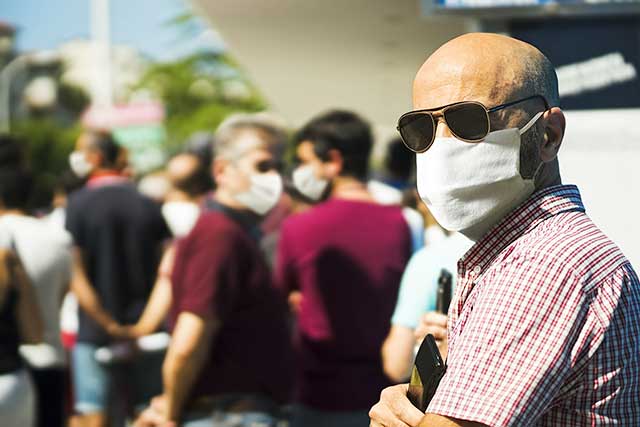The surge in COVID-19 infection rates and growing demand for employee testing has increased the nationwide strain on SARS-CoV-2 diagnostic testing capabilities. Concerns about national COVID-19 lab testing capacity and supply chain distribution methods are growing.
Large diagnostic clinical laboratory providers, such as Quest Diagnostics, LabCorp, and BioReference Laboratories, recently announced to expect longer turnaround times for molecular SARS-CoV-2 testing results. The delays are triggered by several factors, including surging demand and a jolt of suspected infections in certain areas of the US.
American Clinical Laboratory Association (ACLA) President Julie Khani issued a recent statement about the strain the higher demand creates on clinical laboratories. “ACLA member laboratories have seen a steady increase in the volume of COVID-19 test orders,” Khani said. “While our members are collectively performing hundreds of thousands of tests each day, the anticipated demand for COVID-19 testing over the coming weeks will likely exceed members’ testing capacities. This significant increase in demand could extend turnaround times for test results.”

Julie Khani, American Clinical Laboratory Association (ACLA) President, says the anticipated demand for COVID-19 testing over the coming weeks will likely exceed ACLA members’ testing capacities. (Photo source: ACLA)
Clinical laboratories are increasing the number of labs processing tests, purchasing additional testing platforms, and expanding the number of suppliers to provide critical testing materials, according to Khani. “However, the reality of this ongoing global pandemic is that testing supplies are limited. Every country across the globe is in need of essential testing supplies, like pipettes and reagents, and that demand is likely to increase in the coming months.”
Additionally, a laboratory professionals’ collective representing eight other industry organizations more recently addressed the White House in a July 8 letter stating,
“As the virus surges, states and localities need to increase their testing capacity. With sufficient testing supplies, our members would be able to increase testing capacity and conduct more COVID-19 tests,” and requesting:
• A list of the name and contact information for individuals in each state who are overseeing the supply chain for testing supplies and PPE; and
• Visibility into the process of supply allocation, demonstrating that the supplies being distributed at the state level are being allocated in a way that reflects the greatest need to effectively address COVID-19 in the US.
The full text of the letter is available through the Association for Molecular Pathology (AMP) website.
Large Diagnostic Labs Publicly Share Pain of COVID-19 Test Demand
LabCorp indicated in a recent press release that increasing demand for diagnostic testing has saturated their capacity. “In recent weeks, we have seen a steady increase in demand for molecular testing and we are doing everything we can to continue delivering results in a timely manner while continually increasing testing capacity. With the recent increase in demand, results on average may take 1-2 days longer.”
Quest Diagnostics also released a statement addressing their difficulty in keeping up with COVID-19 diagnostic testing demands and the rapid increase in demand. “Despite the rapid expansion of our testing capacity, demand for testing has been growing faster. Orders for our molecular diagnostic services grew by approximately 50 percent over the past three weeks,” Quest said in a press release.
As part of the update on testing capacity, Quest provided insight into the factors influencing this increased demand, citing “increasing spread of the virus across much of the United States; pre-op patients being tested before undergoing procedures in hospital settings; demand from additional sectors, such as federally qualified healthcare centers (FQHCs), nursing homes and prisons; orders from drive/walk through community events held in collaboration with government agencies and corporations; and organizations bringing employees back to work; among other factors.”
At the time of its first announcement June 29, Quest explained that it would offer one-day turnaround times for hospital patients, pre-operative patients in acute-care settings, and symptomatic healthcare workers, with turnaround time for other populations estimated at three to five days. However, Quest revised its lab testing response estimates July 13 for other populations and pointed to nationwide demand, with greater testing needs in the South, Southwest, and West regions of the US. “Our average turnaround time for all other populations is 7 or more days,” the company stated in its update.
BioReference Laboratories also reported reaching its testing capacity. “We hit the wall three weeks ago,” Jon Cohen, the Executive Chairman of BioReference told The Atlantic in an interview published in late June. “At that point, most laboratories were already running at capacity, as far as I can tell. We not only hit capacity, but any ability to increase our capacity became limited by the supply side,” Cohen said. “The vendors, the suppliers can’t keep up.”
Effort to Improve Local Clinical Laboratory COVID-19 Testing Capabilities
Local COVID-19 testing may be one way to possibly overcome the challenges of wait time that may occur as a result of using larger commercial out-of-town laboratory testing services. Providence St. Mary Medical Center in Walla Walla, Washington, for example, combined several different funding sources into a public-private partnership led by the hospital’s Providence St. Mary Foundation to develop in-house rapid molecular testing capabilities, reports the Walla Walla Union Bulletin.
While in-house COVID-19 testing does not necessarily solve the problem of supply shortages, the added SARS-CoV-2 testing capability will have its advantages. “Ultimately our goal is to have all local testing,” stated Providence St. Mary Lab Director David Jansen in the Union Bulletin article, adding, “As more testing comes online we’ll be able to increasingly widen the circle of available testing,” he said in recognizing the added demands of the oncoming traditional flu season.
However, diagnostic SARS-CoV-2 testing capacity strain across the US shows no signs of abating, as the difficulties are explained by the nation’s largest laboratories such as Quest, LabCorp, and BioReference. Additionally, and our parent publication, The Dark Report, covers this in-depth in its July 13 edition, hospital and health system labs and community labs continue to report shortages in necessary lab testing supplies. Thus, local clinical laboratories such as these miss opportunities to provide close-to-home and potentially faster COVID-19 healthcare services.
Unfortunately, current indications are that quick improvements to supply chain problems should not be expected, further explains The Dark Report. Despite the issues, clinical laboratories should continue to focus on growing and expanding their COVID-19 testing capabilities, with the understanding that new testing strategies may be forming in different ways depending on locale, as a recent New York Times article explains one example.
Areas more affected by a rise in cases may have supply priority over less affected areas. Clinical laboratories should also consider the supply chains and reagents that they are currently using to perform SARS-CoV-2 diagnostic testing and have backup plans in place if accessibility of supplies is affected by the growing demand for testing.

—By Caleb Williams, Editor, COVID-19 STAT
Related Resources:
South Omaha COVID Testing Clinic Closed Due To Lab Supply Shortage
Quest Diagnostic Press Releases
The Atlantic: A Dire Warning From COVID-19 Test Providers
American Clinical Laboratory Association Statement on COVID-19 Testing Capacity
Rapid testing equipment for COVID-19 arrives in Walla Walla
Coronavirus updates: Nationwide testing shortage deals setback to surging California
Laboratory Supplies Letter to Vice President Mike Pence
Why You May Not Be Able to Get a Coronavirus Test in California






